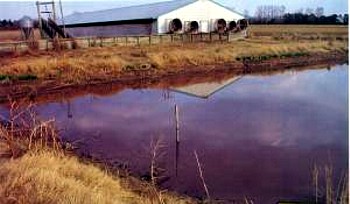North Carolina Hog Farmer To Pay Heavy Fines For Pouring Tons Of Waste Into River System
 August 28, 2012
August 28, 2012  Kyriaki (Sandy) Venetis
Kyriaki (Sandy) Venetis Freedman Farms has been sentenced to five years of probation and ordered to pay $1.5 million in fines, restitution, and community service payments for violating the Clean Water Act for discharging tons of hog waste into a stream that leads into North Carolina’s Waccamaw River.
 Browder’s Branch tributary of Waccamaw River. Photo by Capitol Broadcasting Co.
Browder’s Branch tributary of Waccamaw River. Photo by Capitol Broadcasting Co.
The river system begins at Lake Waccamaw and travels 140 miles through southeastern North Carolina and eastern South Carolina draining into the Atlantic Ocean.
The river begins as a slow-moving blackwater river surrounded by huge expanses of wetlands and evolves into a faster moving river with sandy banks as it makes its way toward the ocean.
Evidence provided to the Eastern District Court of North Carolina showed that Freedman Farms discharged the tons hog waste into the Browder’s Branch tributary of the Waccamaw River that flows through the White Marsh wetland area.
The Freedman case was investigated by the U.S. Environmental Protection Agency’s criminal investigation division and the agency’s science and ecosystem support division. Also involved in the investigation were the U.S. Army Corp. of Engineers and the North Carolina State Bureau of Investigation.
 Freedman Farms. Photo from WWAY NewsChannel 3.
Freedman Farms. Photo from WWAY NewsChannel 3.
Freedom Farms is a corporate hog farm, located in Columbus County, N.C., raising about 4,800 hogs for market. The hog waste was supposed to be directed into two lagoons for treatment and disposal. Instead, the hog waste was released directly into Browder’s Branch tributary.
The Clean Water Act is a federal law that makes it illegal to knowingly or negligently discharge a pollutant into a water system in the United States.
In an order issued by the court, Freedman Farms will be required to pay restitution in the amount of $1 million – in five annual payments starting January 2013 – to the North Carolina Land Trust.

